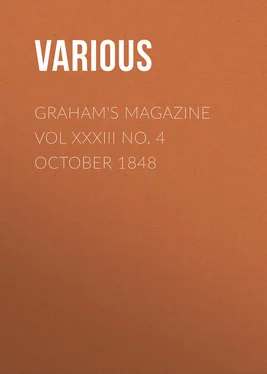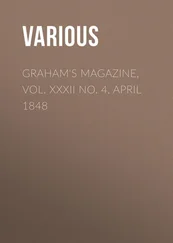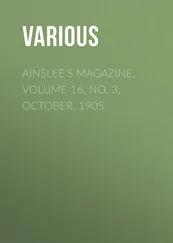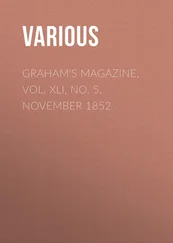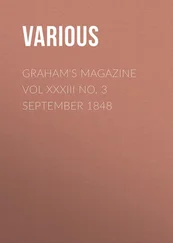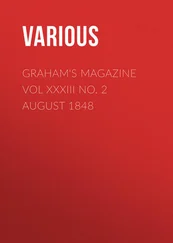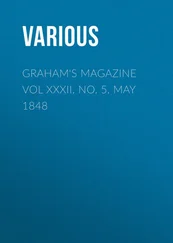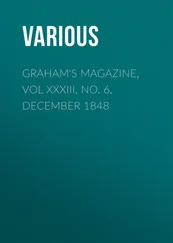Various - Graham's Magazine Vol XXXIII No. 4 October 1848
Здесь есть возможность читать онлайн «Various - Graham's Magazine Vol XXXIII No. 4 October 1848» — ознакомительный отрывок электронной книги совершенно бесплатно, а после прочтения отрывка купить полную версию. В некоторых случаях можно слушать аудио, скачать через торрент в формате fb2 и присутствует краткое содержание. Издательство: Иностранный паблик, Жанр: periodic, literature_19, foreign_edu, на английском языке. Описание произведения, (предисловие) а так же отзывы посетителей доступны на портале библиотеки ЛибКат.
- Название:Graham's Magazine Vol XXXIII No. 4 October 1848
- Автор:
- Издательство:Иностранный паблик
- Жанр:
- Год:неизвестен
- ISBN:нет данных
- Рейтинг книги:3 / 5. Голосов: 1
-
Избранное:Добавить в избранное
- Отзывы:
-
Ваша оценка:
- 60
- 1
- 2
- 3
- 4
- 5
Graham's Magazine Vol XXXIII No. 4 October 1848: краткое содержание, описание и аннотация
Предлагаем к чтению аннотацию, описание, краткое содержание или предисловие (зависит от того, что написал сам автор книги «Graham's Magazine Vol XXXIII No. 4 October 1848»). Если вы не нашли необходимую информацию о книге — напишите в комментариях, мы постараемся отыскать её.
Graham's Magazine Vol XXXIII No. 4 October 1848 — читать онлайн ознакомительный отрывок
Ниже представлен текст книги, разбитый по страницам. Система сохранения места последней прочитанной страницы, позволяет с удобством читать онлайн бесплатно книгу «Graham's Magazine Vol XXXIII No. 4 October 1848», без необходимости каждый раз заново искать на чём Вы остановились. Поставьте закладку, и сможете в любой момент перейти на страницу, на которой закончили чтение.
Интервал:
Закладка:
"The week after my youngest sister was married my father was stricken down with paralysis. I was the only one at home with my parents, for my bride sister had sailed for Europe the day after her wedding, and Emma was far distant in her Southern home, having married a wealthy South Carolinian two years before. Faithfully I devoted myself to my father, and when my mother, a year afterward, was seized with a painful, lingering disease, I made myself so necessary to her comfort, that she at last acknowledged, that what had appeared to be her greatest trouble had proved her greatest blessing. She altered very much before her death, and lost entirely all those worldly feelings which had actuated her during her early life. She suffered for many years at times agonizing pain, and during this time I was sole companion and nurse to my parents. Often I thanked Providence for having denied to me my early love, granting to me in lieu an opportunity of fulfilling the most holy of duties. See, Enna, to what an unromantic and yet enviable state of mind I at last attained. Believe me, dearest, we never should grieve over unavoidable troubles, for many times they are but the rough husk of that sweet kernel – a hidden blessing."
ZENOBIA
'Twas holyday in Rome. Her sevenfold hills
Were trembling with the tread of multitudes
Who thronged her streets. Hushed was the busy hum
Of labor. Silent in the shops reposed
The implements of toil. A common love
Of country, and a zeal for her renown,
Had warmed all hearts, and mingled for a day
Plebian ardor with patrician pride.
The sire, the son, the matron and the maid,
Joined in bestowing on their emperor
The joyous benedictions of the state.
Alas! about that day's magnificence
Was spread a web of shame ! The victor's sword
Was stained with cowardice – his dazzling fame
Tarnished by insult to a fallen woman.
Returning from his conquests in the East,
Aurelian led in his triumphant train
Palmyra's beauteous queen, Zenobia,
Whose only crime had been the love she bore
To her own country and her household gods.
Long had the Orient owned the sovereign sway
Of Rome imperial, and in forced submission
Had bowed the neck to the oppressor's yoke.
The corn of Syria, her fruits and wares,
The pearls of India, Araby's perfumes,
The golden treasures of the mountains, all
Profusely poured in her luxurious lap,
Crowned to the full her proud magnificence.
Rome regal, throned on her eternal hills,
With power supreme and wide-extended hand,
Plundered the prostrate nations without stint
Of all she coveted, and, chiefly thou,
O Liberty, the birthright boon of Heaven.
But Rome had passed her noon; her despotism
Was overgrown; an earthquake was at work
At her foundations; and new dynasties,
Striking their roots in ripening revolutions,
Were soon to sway the destinies of realms.
The East was in revolt. The myriad seeds
Of dark rebellion, sown by tyranny,
And watered by the blood of patriots slain,
Were springing into life on every hand.
Success was alternating in this strife
'Twixt power and right , and anxious Victory,
With balance poised, the doubtful issue feared.
Amid the fierce contention, 'mid the din
Of war's sublime encounter, and the crash
Of falling systems old, Palmyra's queen
Followed her valiant lord, Palmyra's king.
Ever beside him in the hour of peril,
She warded from his breast the battle's rage;
And in the councils of the cabinet
Her prudent wisdom was her husband's guide.
Domestic treason, with insidious stab,
Snatched from Zenobia's side her gallant lord,
And threw into her hand the exigencies
Of an unstable and capricious throne.
Yet was her genius not inadequate.
The precepts of experience, intertwined
With intellectual power of lofty grade,
Combined to raise Palmyra's beauteous queen
High in the golden scale of moral greatness.
Under the teachings of the good Longinus
The streams of science flowed into her mind;
And, like the fountain-fostered mountain lake,
Her soul was pure as its ethereal food.
The patronage bestowed on learned men
Declared her love for letters. The rewards,
Rich and unnumbered, she conferred on merit
Her own refined, exalted taste betrayed.
Her graceful and majestic figure, crowned
With beauty such as few but angels wear,
Like the rich casing that surrounds the gem,
Heightened the splendor of her brilliant genius.
Equally daring on the battle-field
And in the chase, her prudence and her courage,
Displayed in many a hot emergency,
Had twined victorious laurel round her brow.
Under her rule Palmyra's fortunes rose
To an unequalled altitude, and wealth
Flowed in upon her like a golden sea,
Her wide dominion, stretching from the Nile
To the far Euxine and Euphrates' flood —
Her active commerce, whose expanded range
Monopolized the trade of all the East —
Her stately capital, whose towers and domes
Vied with proud Rome in architectural grace —
Her own aspiring aims and high renown —
All breathed around the Asiatic queen
An atmosphere of greatness, and betrayed
Her bold ambition, and her rivalry
With the imperial mistress of the world.
But 't is the gaudiest flower is soonest plucked;
The sturdiest oak first feels the builder's axe.
Palmyra's rising greatness had awaked
The jealousy of Rome, and Fortune looked
On her prosperity with envious eye.
Under the golden eagles of the empire,
Aurelian's soldiers swept the thirsty sands,
And poured into Palmyra's palmy plains,
A mighty host hot for the battle-field.
Borne on her gallant steed, the warrior queen
The conflict sought, and led her eager troops
Into the stern encounter. Like the storm
Of their own desert plain, innumerable,
They rushed upon the foe, and courted danger.
Amid the serried ranks, whose steel array
Glowed in the noonday sun, and threw a flood
Of wavy sheen into the fragrant air,
Zenobia rode; and, like an angry spirit,
Commissioned from above to chastise men,
Where'er she moved was death. There was a flash
Of scorn that lighted up her fiery eye,
A glance of wrath upon her countenance —
There was a terror in her frenzied arm
That struck dismay into the boldest heart.
Alas for her, Fortune was unpropitious!
Her fearless valor found an overmatch
In the experienced prudence of Aurelian;
And scarcely could the desert's hardy sons
Cope with the practiced legions of the empire.
The battle gained, Palmyra taken, sacked —
Its queen a captive, hurled from off a throne,
Stripped of her wide possessions, forced to sue
In humblest attitude for even life —
The haughty victor led his weary legions
Back to Italia's shores, and in his train
His fallen rival, loaded with chains of gold,
Forged from the bullion of her treasury.
'Twas holyday in Rome. The morning sun,
Emerging from the palace-crested hills
Of the Campagna, poured a flood of light
Upon the slumbering city, summoning
Its teeming thousands to the festival.
A playful breeze, rich-laden with perfume
From groves of orange, gently stirred the leaves,
And curled the ripples on the Tiber's breast,
Bearing to seaward o'er the flowery plain
The rising peans' joyful melodies.
Flung to the wind, high from the swelling dome
That crowned the Capitol, the imperial banner,
Broidered with gold and glittering with gems,
Unfurled its azure field; and, as it caught
The sunbeams and flashed down upon the throng
That filled the forum, there arose a shout
Deep as the murmur of the cataract.
In that spontaneous outburst of applause
Rome spoke ; and as the echo smote the hills
It woke the slumbering memory of a time
When Rome was free .
Интервал:
Закладка:
Похожие книги на «Graham's Magazine Vol XXXIII No. 4 October 1848»
Представляем Вашему вниманию похожие книги на «Graham's Magazine Vol XXXIII No. 4 October 1848» списком для выбора. Мы отобрали схожую по названию и смыслу литературу в надежде предоставить читателям больше вариантов отыскать новые, интересные, ещё непрочитанные произведения.
Обсуждение, отзывы о книге «Graham's Magazine Vol XXXIII No. 4 October 1848» и просто собственные мнения читателей. Оставьте ваши комментарии, напишите, что Вы думаете о произведении, его смысле или главных героях. Укажите что конкретно понравилось, а что нет, и почему Вы так считаете.
